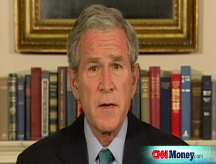Oil sinks below $99
Government report stokes fears of softening demand and crude traders see little benefit from bailout plan.
NEW YORK (CNNMoney.com) -- The price of oil fell Wednesday after a key inventory report highlighted concerns about waning demand and doubts emerged about the impact of the government's proposed bailout plan.
Light, sweet crude for November delivery fell $2.11 a barrel to settle at $98.53 on the New York Mercantile Exchange.
The contract tumbled more than $5 a barrel shortly after the Energy Department said supplies of crude oil and gasoline unexpectedly rose last week, suggesting that demand in the U.S. remains weak.
The market recovered from its "knee-jerk selloff," said Stephen Schork, oil industry expert and publisher of the Schork Report. But Wednesday's data suggest that the "downward trend in crude prices will continue."
Inventory report. The Energy Information Administration said Wednesday morning that the nation's supply of crude oil increased by 4.3 million barrels last week. Crude stocks were expected to have gained or lost 1.5 million barrels, according to a consensus estimate of industry analysts surveyed by energy information provider Platts.
Gasoline supplies grew by 900,000 barrels, surprising analysts who had forecast a decline of 1 million to 2 million barrels.
But Schork said last week's growth in gasoline supplies was not consistent with the overall trend.
"Given the ongoing demand destruction, expect to see more draws in gas," he said.
Demand for gasoline over the four weeks ended Sept. 26 was down 4.5% from the same period last year, according to the EIA.
The EIA report also showed that oil products supplied over the last four-week period averaged 19 million barrels a day. That's down 7.1% compared to the similar period last year.
"Demand was anemic," said John Kilduff, energy analyst at MF Global in New York. And the EIA report "speaks to the lack of economic activity in the U.S."
Supplies of distillates, used to make diesel fuel and heating oil, fell by 2.3 million barrels. Analysts were expecting distillate stocks to decline 1 million to 2 million barrels, according to Platts.
Meanwhile, the nation's refineries operated at 72.3% of their operable capacity last week, up from 66.7% the week before.
Bailout doubts. The price of oil has been pressured recently by concerns that a global economic slowdown will undercut demand for petroleum products.
"Confidence in U.S. economy, the U.S. banking sector and the global economy is severely shaken," said Schork. "I cannot see a reason to own $100 oil at this time."
In response to the nation's economic strife, the Bush Administration has proposed a massive intervention in the financial system. But the controversial plan met with strong opposition from the public and was scuttled in the House of Representatives on Monday.
Senate lawmakers are expected to vote on a modified version of the bailout plan Wednesday evening.
Supporters of the intervention say it is a critical first step in stabilizing the financial markets and reinvigorating the nation's economy.
However, several analysts expressed doubts that a bailout would have a significant impact on the price of oil.
"I'm not sure the reaction [to the plan] will be overwhelmingly enthusiastic," Kilduff said.
The economic outlook for the U.S. is grim, Kilduff said. And the bailout may not be enough to spur sustained demand for oil and gas.
"We've still got a lot of work to do," Kilduff said.
Gasoline. The government data come as prices at the pump continue to fall.
A daily survey by the American Automobile Association showed Wednesday that the national average price for a gallon of regular gas fell to $3.619 from $3.633 the day before.
Gas prices have dropped dramatically from mid-summer's highs and are now 12%, or 49 cents, less than the record of $4.114 a gallon set on July 17.
Diesel prices, meanwhile, held steady overnight at $4.078 a gallon. ![]()





